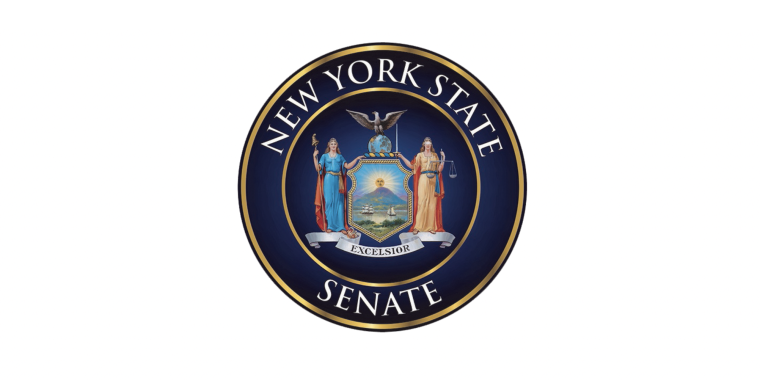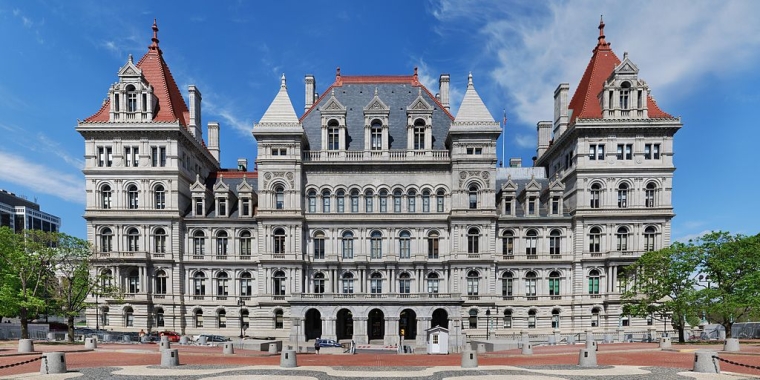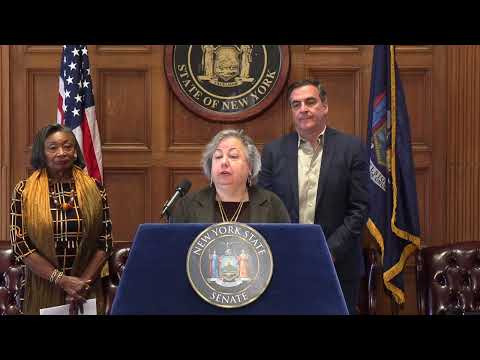
Senate Democrats Advocate for Bipartisan Passage of Enhanced Statewide Brownfields Legislation to Accelerate Neighborhood Clean-ups and Provide $1 Billion in Tax Credits New legislation would also create new jobs, help build affordable housing and provide
Liz Krueger
May 27, 2008
(Albany, NY) The New York State Senate Democratic Conference today called for the Governor and State Legislators, both Republican and Democrat, to take action before the end of session and approve new Brownfields legislation that will speed-up neighborhood clean-up projects statewide.
At stake, are nearly $1 billion in state tax credits and $40 million in state-funded community planning grants that can be used to help reclaim thousands of polluted sites in urban, suburban, rural, industrial, and residential areas across New York state if action isn't taken now.
Democratic Leader Malcolm A. Smith (D-St. Albans) said that bipartisan support is needed to pass the legislation to expand and improve the current five-year Brownfield Cleanup Program by effectively targeting public funding to create economic opportunities in areas suffering from abandonment, neglect, and environmental damage.
"We need to jump start these negotiations for the sake of all New Yorkers," Senator Smith said. "To clean-up contaminated sites for beneficial reuse in our upstate areas is critical to creating new jobs and affordable housing."
The legislation (S. 6177A) authored by State Senator Antoine Thompson (D-Buffalo/Niagara Falls), includes a new Brownfield "Shovel-Ready" program that would bring the Empire State Development Corporation, New York's most powerful development arm, into Brownfield projects. Brownfields are contaminated and/or rundown properties found statewide that have been identified for remediation, development or expansion into usable properties.
Senator Thompson said: "This new legislation protects the environment and provides other economic development measures that will benefit all New Yorkers today, as well as, our children and future generations."
The bipartisan deal is needed before the end of session next month "to maximize the benefits of the nearly billion dollars available in Brownfield Tax Credits."
Democratic Senators Thompson and Velmanette Montgomery (D-Brooklyn), Republican Senator Carl Marcellino (R-Syosset), Assemblyman Robert Sweeney (D-Lindenhurst) and Governor David Paterson have all contributed bills to improve the state's Brownfields programs.
"Moving forward to remediate brownfields not only addresses the cleanup of environmental hazards; but it helps our localities access the land needed to build new affordable housing, support economic development and increase needed urban open space. In upstate and downstate, our communities need all of this to meet the challenges of the 21st century," said Senator Liz Krueger (D-Manhattan).
There are many sites around the state where businesses have left--such as gas stations, retail spaces and factories--that have severely impacted surrounding communities, Senator Thompson said.
"This new legislation would not only combat urban blight, but create jobs as well," he added.
The Empire State Development Corporation Plays Key Role
A key component of the new legislation is that the Empire State Development Corporation would be charged with boosting jobs and local development.
Under Senator Thompson's proposal, the Empire State Development Corporation would have the power to purchase contaminated properties, clean them to meet state environmental standards using local, state and federal grants, and sell the properties to businesses. In exchange, those businesses would agree to build quality structures and create new jobs. Additional requirements include, the majority of the jobs be filled by local residents and pay competitive living wages plus benefits.
Smith said the new ESDC role could spur new job creation and local economic development through recycling and manufacturing-center development through Brownfield projects.
"With ESDC involved we would have the power to create new green-jobs that can help boost the state's economy and tax-base," Smith said. "This is a win-win situation."
Environmental advocates praised the proposed bipartisan legislation saying the measures would save tax dollars and "help safeguard the environment of the Empire State."
Mathy Stanislaus, Co-Director, New Partners for Community Revitalization, Inc., said: “The Brownfields Law must be fixed this session for it to be a tool to assist economically distressed communities throughout New York State.
“The focus of the fix must be to target the Brownfields tax credit to projects that need financial assistance,” Stanislaus said. “A significant Brownfields tax credit bonus must be provided for sites built consistent with Brownfield Opportunity Area plans to enable the economic recovery of urban centers throughout New York State while also serving smart growth by protecting against sprawl. The BOA program must be streamlined by placing its administration in a single agency the Department of State.”
Robert Moore, executive director of Environmental Advocates of New York, said that his organization was calling “on the state to stop wasting green and start acting green”.
“It's time to rethink New York's brownfields program so that it encourages cleanups where they're most needed, rather than squandering taxpayer dollars on give-aways to developers," Moore said.
Frank Mauro, Executive Director of the Fiscal Policy Institute, said: "Where land is scarce and the demand for office space or...other large, expensive buildings is high, it makes economic sense to build such large, expensive buildings. But, there is absolutely no reason for the state to subsidize the development costs in such situations. Helping out with the remediation costs is more than enough.”
Ensure the Best Use of Public Funds
The proposed bipartisan legislation would:
Move the Administration of the Brownfield Opportunity Area (BOA) program to the Department of State, eliminating current dual-agency requirements to streamline review and expedite projects. The Department of State has experience and staff to facilitate and carry out planning processes, including smart growth planning, waterfront redevelopment, and other urban planning work
Coordinate community priorities to ensure that planning grants and state tax credits are consistent with community interests.
Require all new projects to qualify with state-funded Brownfield Tax Credits (BTCs) in order to meet the Brownfield Opportunity Area (BOA) program qualifications.
Improve the Effectiveness and Efficiency of Tax Credits
Thompson said that the process needed to be "streamlined" with the State Department of Environmental Conservation, working closely with the Department of Economic Development, to set clear and transparent standards that will allow developers to predict if they qualify for BTC tax credits – which is currently required.
Additionally, the legislation would:
Require the Department of Economic Conservation to consult with the Division of Housing and Community Renewal and the Housing Finance Agency to develop standards to ensure BTC tax credits can be use on affordable housing when standard requirements are met.
Provide clarification to allow the use of BTC credits to clean up pollution that has migrated from its original source.
Smith said: the proposed new standards will provide additional accountability and prevent abuse of the use of public redevelopment Brownfield Tax Credits.
Brownfields Can Be Beautiful
Thompson said that there are areas in his Buffalo community where vacant, dilapidated, run-down, and rusted-out buildings that were once manufacturing plants serve as reminders of how prosperous upstate can be.
"This is the ultimate recycling of urban eyesores being transformed into new, shovel-ready sites that will serve as an invitation to what our state can and will be, while attracting companies that are committed to paying good wages for New York state's great worker talent-pool," said Senator Thompson.
Senator Smith said: "You are talking about restoring the heart and soul of a community. Once a site is cleaned-up, and restored it provides not only an economic boost but increases the self-esteem of the community. Brownfields can be beautiful."
--30--
Share this Article or Press Release
Newsroom
Go to Newsroom
Senator Krueger's February 2025 Update
February 28, 2025


